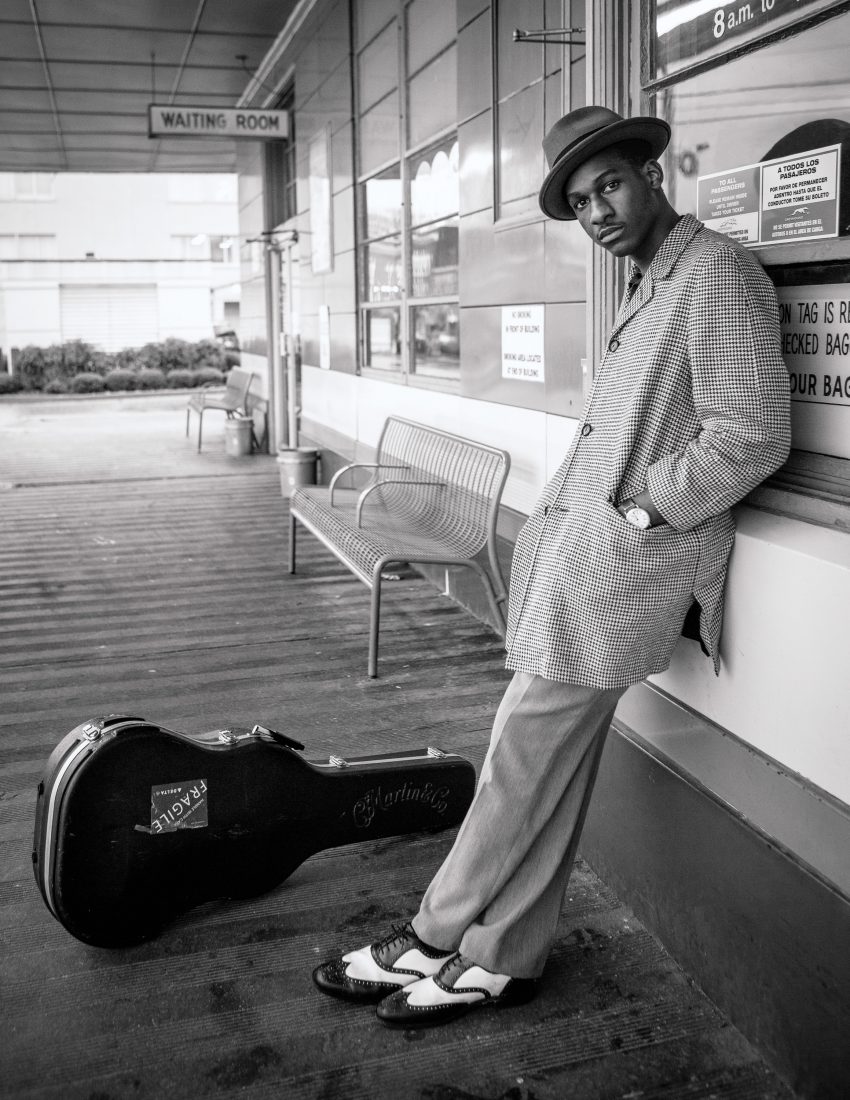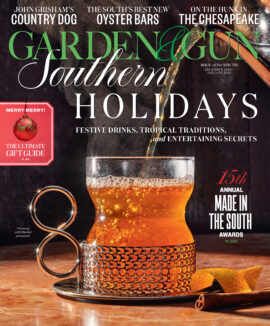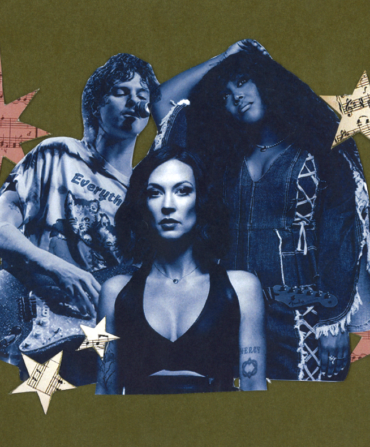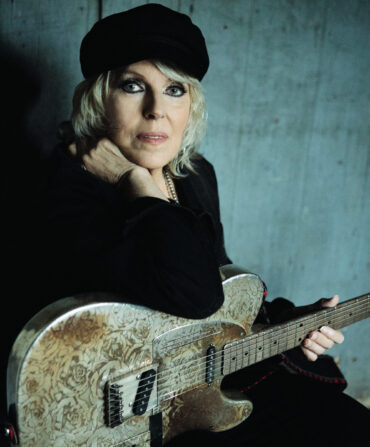-
Leon Bridges
Soul’s Young Prince
Leon Bridges has such a silky-smooth voice that after posting one song online, the twenty-five-year-old had record execs salivating and became the subject of a ferocious bidding war. A showcase at the Stone Fox, a Nashville club, attracted scores of bigwigs from labels around the world. He ended up signing with Columbia, and his career has been on a jet-fuel-powered ride since. Out this summer, his debut album, Coming Home, is an homage to old-school soul, with a Sam Cooke vibe so thick one critic said about his voice, “a cardigan sweater may materialize on your back while you’re listening to it.” Bridges, who as a kid growing up in Fort Worth, Texas, was a fan of contemporary R&B artists such as Usher and Ginuwine, discovered classic soul in the most twenty-first-century way: the online music service Pandora. He listened obsessively and found his niche, though with a genuine love of the genre. “I didn’t do it to be successful,” he says. “I’m doing it because it feels good.”
While traditional soul provides the framework, Bridges fills it in with a fresh snap and crackle. Recorded on vintage equipment with some friends in Fort Worth, Coming Home sizzles with precise singing, shiver-inducing call-and-response moments, and a crack band that provides a swell of dynamic turns. And then there’s his style: a pair of slacks cinched up to the waist, a natty blazer, a collared shirt, and spit-shined shoes. “When I started writing, I wanted to make everything consistent,” he says, “the style, my image, and the music, everything that I do. It’s an OCD thing.” Look out: Leon Bridges is ready for his close-up.
-
The Deslondes
Louisiana Mash-Up
If you’re laden with the blues, usually the blues is going to win. Not so for New Orleans outfit the Deslondes. The wry “Fought the Blues and Won” is the first song on their rollicking self-titled June debut. “I was listening to a lot of Fats Domino,” says bandleader Sam Doores, “and [bandmate] Riley Downing came up with lyrics, and we all went to the studio and sang along.” The Deslondes call their music “country soul,” and the album is a patchwork of influences: the powerful sound of the Stax and Sun Records era, Keith Richards-esque guitar riffs, harmonies that recall the Band, and the country folk of Townes Van Zandt. Each member takes turns as the lead singer, with others switching instruments, lending a true troubadour feel. It’s a collage that’s sown deep into the laid-back fabric of the Big Easy. “There’s no industry pressure in New Orleans like in Nashville,” Doores says. “You can be in a calypso band one night, a blues band the next. It’s a wonderful city to make music in.”
-
Fantastic Negrito
Blues Superman
There’s a whole lot of whimsy in the music of Fantastic Negrito, starting with that name. “Black roots music should be celebrated,” he says. “It’s fantastic! I wanted Negrito to be kind of fun. It sounds like a superhero.” His debut self-titled EP lives up to his moniker (his given name is Xavier Dphrepaulezz) with greasy blues riffs and his ragged, soulful croon, which impressed NPR so much it chose him—out of almost seven thousand video entries—to perform for its Tiny Desk Concert series. But the forty-seven-year-old has a wise and measured streak, too, due to the implosion of his first record deal and a catastrophic car wreck in 2000 that nearly took his life. Years of rehabilitation followed, and he gave up on music, selling all of his equipment except one guitar that was in rough shape. When his infant son couldn’t sleep one night, he instinctively grabbed it to soothe him. “I played him an open G chord, and he just smiled,” he says. “There was a look on his face I’ll never forget.” Though Dphrepaulezz lives in Oakland, California, he made some formative visits to his grandmother’s farm in southern Virginia, where a scoundrel great-uncle schooled him in country blues while drinking Johnnie Walker Red, sending him on a path of discovery. “Robert Johnson, R. L. Burnside, Fred McDowell—they were the masters,” he says. “I’m very lucky I get to honor them.”
-
Adia Victoria
The Free Spirit
“The messiness of life appeals to me,” says Adia Victoria. “Not the pretty boxes that we all seem to put people into.” After growing up in a strict Seventh Day Adventist family in Spartanburg, South Carolina, Victoria turns it loose on gruff, deeply personal songs like the tormented “Howlin’ Shame” and “Stuck in the South,” which caused a stir when she released it online last summer. With a sizzling blues lick and her sassy howl of lyrics such as “I don’t know nothin’ ’bout Southern belles, but I can tell you somethin’ ’bout Southern hell,” Victoria’s music and life are informed by, as Drive-By Truckers’ Patterson Hood has put it, “the duality of the Southern thing,” a reference to loving the South while wrestling with its painful history. “I love it, and it took me a while to realize how much I loved it,” she says. A self-described “weirdo,” Victoria has taken her own approach to releasing her music, putting songs out individually and honing her searing live shows. “I’m just having fun,” she says. “I’m recording my life for you guys and sharing it when I feel like it.”
-
Leo "Bud" Welch
The Old-School Newcomer
It’s been a long time coming for Leo “Bud” Welch. After he spent thirty-odd years singing and playing gospel blues at his Mississippi church, his friend Vencie Varnado called the offices of Oxford’s Fat Possum Records, a label that made its name on new recordings from Hill Country greats such as R. L. Burnside, Junior Kimbrough, and T-Model Ford. Varnado asked if Welch could audition for the label. An intern answered the phone and was about to give him the brush-off when fate stepped in, or more accurately the label’s manager, Bruce Watson, who happened to overhear the conversation. Watson grabbed the phone, and Welch soon had a record deal. He released his debut album of classic gospel blues last year, at eighty-one years old. This spring brought his second effort on Fat Possum’s Big Legal Mess imprint, I Don’t Prefer No Blues, a collection of buzz-saw Hill Country sounds. It’s a just reward for a man whose life’s work was cutting timber in the Mississippi woods. “I get to travel the world playing music that I love,” he says. “I feel like a new man.”
-
The Word
A Supergroup Returns
Although the members of the Word certainly aren’t newbies, their improvisational gospel-blues instrumentals on Soul Food are the group’s first recordings since 2001. The band is made up of a heavyweight team of seasoned musicians: keyboardist John Medeski, pedal steel master Robert Randolph, and North Mississippi Allstars Luther and Cody Dickinson and Chris Chew. “We play tunes and hymns, but we are at our best when we are following the music and each other,” Luther Dickinson says. “We love going out on a limb and breaking it.” Soul Food is an intoxicating, glory-filled ride, much of it recorded on a whim right after a fantastic meal of soul food cooked by an aunt of Boo Mitchell’s, the manager and co-owner of the legendary Royal Studios in Memphis. “I have never had a meal with as much hooting and hollering and goings-on,” Dickinson says. “The food was so delicious and the stories were so funny. As soon as we were done, Robert said, ‘Let’s go, let’s record. We have to play after that meal!’
Artists
The New Heavies
Six rising artists putting their own spin on blues and soul

Photo: David McClister
Lean Bridges, photographed at the Greyhound Bus Station in Jackson, Tennessee.






